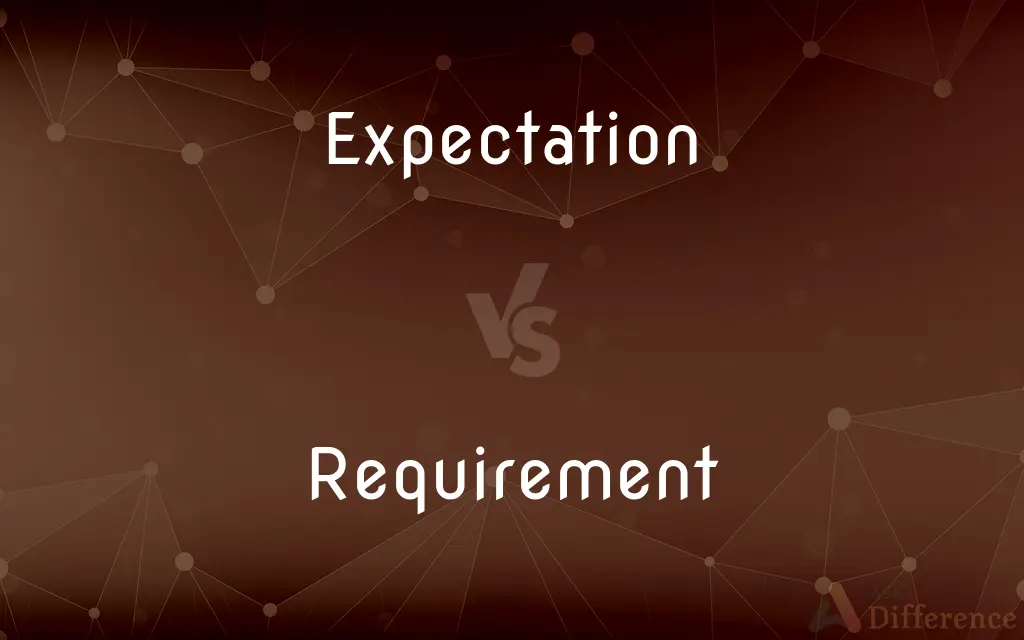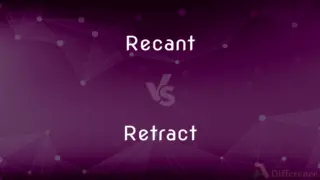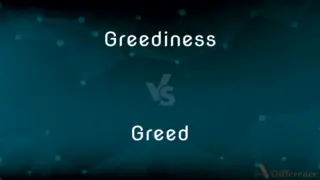Expectation vs. Requirement — What's the Difference?
By Maham Liaqat & Urooj Arif — Updated on March 10, 2024
Expectation is a belief about a future outcome, while a requirement is a necessary condition that must be fulfilled.

Difference Between Expectation and Requirement
Table of Contents
ADVERTISEMENT
Key Differences
An expectation refers to a belief or anticipation about what will happen in the future or how someone will behave. It is often based on past experiences, societal norms, or personal desires. On the other hand, a requirement is a specific condition or stipulation that must be met for a particular purpose or to achieve a certain standard. Requirements are more formal and mandatory, often outlined in contracts, job descriptions, or regulations.
While expectations can influence behavior and decisions, they do not carry the mandatory nature that requirements do. Expectations are subjective and can vary widely between individuals and situations, whereas requirements are usually clearly defined and objective.
Expectations can lead to disappointment if not met, as they are based on personal beliefs or desires. In contrast, failure to meet a requirement typically results in more concrete consequences, such as legal penalties, loss of opportunities, or the inability to complete a task or project.
Expectations are anticipatory beliefs about future outcomes or behaviors, often influenced by past experiences or societal norms, while requirements are objective conditions that must be met for specific purposes, carrying a mandatory and formal nature.
Comparison Chart
Definition
A belief or anticipation about a future outcome.
A necessary condition or stipulation that must be met.
ADVERTISEMENT
Nature
Subjective and based on personal or societal norms.
Objective and clearly defined, often formally stated.
Consequences
Disappointment or adjustment of beliefs if unmet.
Concrete penalties or loss of opportunities if unmet.
Origin
Based on past experiences, norms, or desires.
Stipulated by authority, standards, or regulations.
Flexibility
Can vary and be adjusted over time.
Usually fixed and non-negotiable.
Compare with Definitions
Expectation
A belief about how someone will behave or what will happen in the future.
The expectation was that the project would be completed by Friday.
Requirement
A condition that must be fulfilled before a task can be performed.
A valid ID is a requirement for boarding a flight.
Expectation
An anticipation based on past experiences or societal norms.
There is an expectation in many cultures to tip service workers.
Requirement
A stipulated level of quality or achievement.
The software must meet performance requirements to be accepted.
Expectation
A standard or level of performance anticipated from someone.
The teacher's expectations for her students were always high.
Requirement
A necessity or prerequisite for a particular purpose.
Passing the certification exam is a requirement for the job.
Expectation
A hope or desire for a particular outcome.
His expectation to win the award was high due to his hard work.
Requirement
A formal or official demand or necessity.
The law sets strict requirements for food safety.
Expectation
The act of expecting or looking forward to something.
The expectation of the movie's release had fans excited.
Requirement
Something called for as a necessary condition.
Regular attendance is a requirement for passing the course.
Expectation
The act of expecting.
Requirement
In product development and process optimization, a requirement is a singular documented physical or functional need that a particular design, product or process aims to satisfy. It is commonly used in a formal sense in engineering design, including for example in systems engineering, software engineering, or enterprise engineering.
Expectation
Eager anticipation
Eyes shining with expectation.
Requirement
A thing that is needed or wanted
Choose the type of window that suits your requirements best
Expectation
The state of being expected.
Requirement
Something that is required; a necessity.
Expectation
Something expected
A result that did not live up to expectations.
Requirement
Something obligatory; a prerequisite.
Expectation
Expectations Prospects, especially of success or gain.
Requirement
A necessity or prerequisite; something required or obligatory. Its adpositions are generally of in relation to who or what has given it, on in relation to whom or what it is given to, and for in relation to what is required.
There was a requirement of the government on citizens for paying taxes.
Expectation
The expected value of a random variable.
Requirement
Something asked.
Expectation
The mean of a random variable.
Requirement
A statement (in domain specific terms) which specifies a verifiable constraint on an implementation that it shall undeniably meet or (a) be deemed unacceptable, or (b) result in implementation failure, or (c) result in system failure.
Expectation
The act or state of expecting or looking forward to an event as about to happen.
Requirement
The act of requiring; demand; requisition.
Expectation
That which is expected or looked for.
Requirement
That which is required; an imperative or authoritative command; an essential condition; something needed or necessary; a need.
One of those who believe that they can fill up every requirement contained in the rule of righteousness.
God gave her the child, and gave her too an instinctive knowledge of its nature and requirements.
Expectation
The prospect of the future; grounds upon which something excellent is expected to occur; prospect of anything good to come, especially of property or rank.
Requirement
Required activity;
The requirements of his work affected his health
There were many demands on his time
Expectation
The value of any chance (as the prospect of prize or property) which depends upon some contingent event.
Requirement
Anything indispensable;
Food and shelter are necessities of life
The essentials of the good life
Allow farmers to buy their requirements under favorable conditions
A place where the requisites of water fuel and fodder can be obtained
Expectation
(statistics) The first moment; the long-run average value of a variable over many independent repetitions of an experiment.
Requirement
Something that is required in advance;
Latin was a prerequisite for admission
Expectation
(colloquial statistics) The arithmetic mean.
Expectation
The leaving of a disease principally to the efforts of nature to effect a cure.
Expectation
The act or state of expecting or looking forward to an event as about to happen.
My soul, wait thou only upon God, for my expectation is from him.
Expectation
That which is expected or looked for.
Why our great expectation should be calledThe seed of woman.
Expectation
The prospect of the future; grounds upon which something excellent is expected to happen; prospect of anything good to come, esp. of property or rank.
His magnificent expectations made him, in the opinion of the world, the best match in Europe.
By all men's eyes a youth of expectation.
Expectation
The value of any chance (as the prospect of prize or property) which depends upon some contingent event. Expectations are computed for or against the occurrence of the event.
Expectation
The leaving of the disease principally to the efforts of nature to effect a cure.
Expectation
Belief about (or mental picture of) the future
Expectation
Wishing with confidence of fulfillment
Expectation
The feeling that something is about to happen
Expectation
The sum of the values of a random variable divided by the number of values
Common Curiosities
What is a requirement?
A requirement is a specific condition that must be met for a particular purpose, often formally stated and mandatory.
What is an expectation?
An expectation is a belief or anticipation about a future outcome, often based on past experiences or societal norms.
What happens when expectations are not met?
Unmet expectations can lead to disappointment, frustration, or a reassessment of beliefs or strategies.
How do expectations differ from requirements?
Expectations are subjective beliefs about future outcomes, while requirements are objective conditions that must be met for specific purposes.
Can expectations become requirements?
In some contexts, such as in a workplace, certain expectations can evolve into formal requirements if they are codified in policies or contracts.
Can expectations be negotiated?
Expectations can sometimes be discussed and adjusted in personal or professional relationships, unlike formal requirements which are less flexible.
What are the consequences of not meeting a requirement?
Failing to meet a requirement can result in concrete consequences like penalties, loss of opportunities, or the inability to achieve a goal.
Is it possible to have no expectations?
While it may be difficult to have absolutely no expectations, some people aim to minimize their expectations to reduce potential disappointment.
How can one manage expectations effectively?
Managing expectations involves clear communication, realistic goal-setting, and understanding the perspectives and limitations of all parties involved.
Can requirements change over time?
Requirements can evolve due to changes in regulations, technological advancements, or shifts in organizational goals.
How are requirements determined?
Requirements are typically determined by authorities, standards, or regulations relevant to the specific context or goal.
Are requirements always formal?
Requirements are often formally stated, especially in professional, legal, or academic contexts, but informal requirements can exist in certain situations.
Can a person have expectations of themselves?
Yes, individuals often have personal expectations regarding their own behavior, achievements, or future outcomes.
Do cultural differences affect expectations?
Yes, cultural norms and values significantly influence what is expected in different societal or interpersonal contexts.
Why are requirements important?
Requirements are crucial for setting clear standards and conditions that ensure the reliability, safety, and effectiveness of processes or products.
Share Your Discovery

Previous Comparison
Recant vs. Retract
Next Comparison
Greediness vs. GreedAuthor Spotlight
Written by
Maham LiaqatCo-written by
Urooj ArifUrooj is a skilled content writer at Ask Difference, known for her exceptional ability to simplify complex topics into engaging and informative content. With a passion for research and a flair for clear, concise writing, she consistently delivers articles that resonate with our diverse audience.
















































